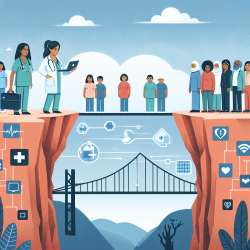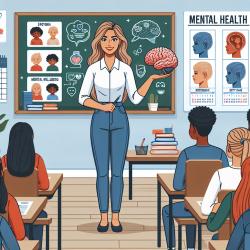The recent publication, "The Lancet NCDI Poverty Commission: bridging a gap in universal health coverage for the poorest billion," provides a wealth of data and insights that can be transformative for speech-language pathologists (SLPs) working with children in schools. The research highlights significant gaps in healthcare coverage and offers evidence-based strategies to bridge these gaps, particularly for non-communicable diseases and injuries (NCDIs) among the world's poorest populations. By leveraging these insights, practitioners can improve their service delivery and advocate for better resources and policies.
At TinyEYE, we are committed to providing top-tier online therapy services to schools. We believe that data-driven decisions are crucial for achieving the best outcomes for children. Here's how the findings from The Lancet NCDI Poverty Commission can be applied to enhance speech-language pathology in educational settings:
Understanding the Gaps
The Lancet Commission identifies significant disparities in healthcare access and outcomes for NCDIs, which include conditions like developmental disorders and speech impairments. These disparities are even more pronounced in low-income and lower-middle-income countries (LLMICs). Understanding these gaps is the first step toward addressing them. SLPs can use this data to identify areas where children are most at risk and tailor their interventions accordingly.
Implementing Evidence-Based Interventions
The Commission emphasizes the importance of implementing affordable, cost-effective, and equitable interventions. For SLPs, this means adopting evidence-based practices that have been proven to work in diverse settings. Online therapy platforms like TinyEYE offer a unique advantage by providing access to high-quality therapy regardless of geographical location. By using data to inform practice, SLPs can ensure that their interventions are both effective and equitable.
Advocating for Resources and Policy Changes
One of the key messages from the Commission is the need for increased funding and resources to address NCDIs. SLPs can play a crucial role in advocating for these resources within their schools and communities. By presenting data on the impact of speech and language disorders and the benefits of early intervention, SLPs can make a compelling case for additional funding and support.
Collaborating with Stakeholders
The Commission calls for multi-sectoral collaboration to address the complex needs of children with NCDIs. SLPs can work closely with teachers, parents, healthcare providers, and policymakers to create a supportive network for children. This collaborative approach ensures that all aspects of a child's development are addressed, leading to better outcomes.
Utilizing Technology for Better Outcomes
Online therapy platforms like TinyEYE leverage technology to provide consistent and accessible therapy sessions. The use of teletherapy has been shown to be as effective as in-person therapy for many children. By incorporating technology into their practice, SLPs can reach more children and provide continuous support, even in remote or underserved areas.
Encouraging Further Research
The Lancet Commission highlights the need for ongoing research to understand and address NCDIs fully. SLPs can contribute to this body of knowledge by participating in research studies and sharing their findings. This ongoing research is essential for developing new and innovative interventions that can improve the lives of children with speech and language disorders.
In conclusion, the insights from The Lancet NCDI Poverty Commission offer valuable guidance for SLPs looking to enhance their practice and advocate for better resources and policies. By focusing on data-driven decisions and evidence-based interventions, SLPs can help bridge the gap in healthcare coverage and improve outcomes for children in schools.
To read the original research paper, please follow this link: The Lancet NCDI Poverty Commission: bridging a gap in universal health coverage for the poorest billion.










